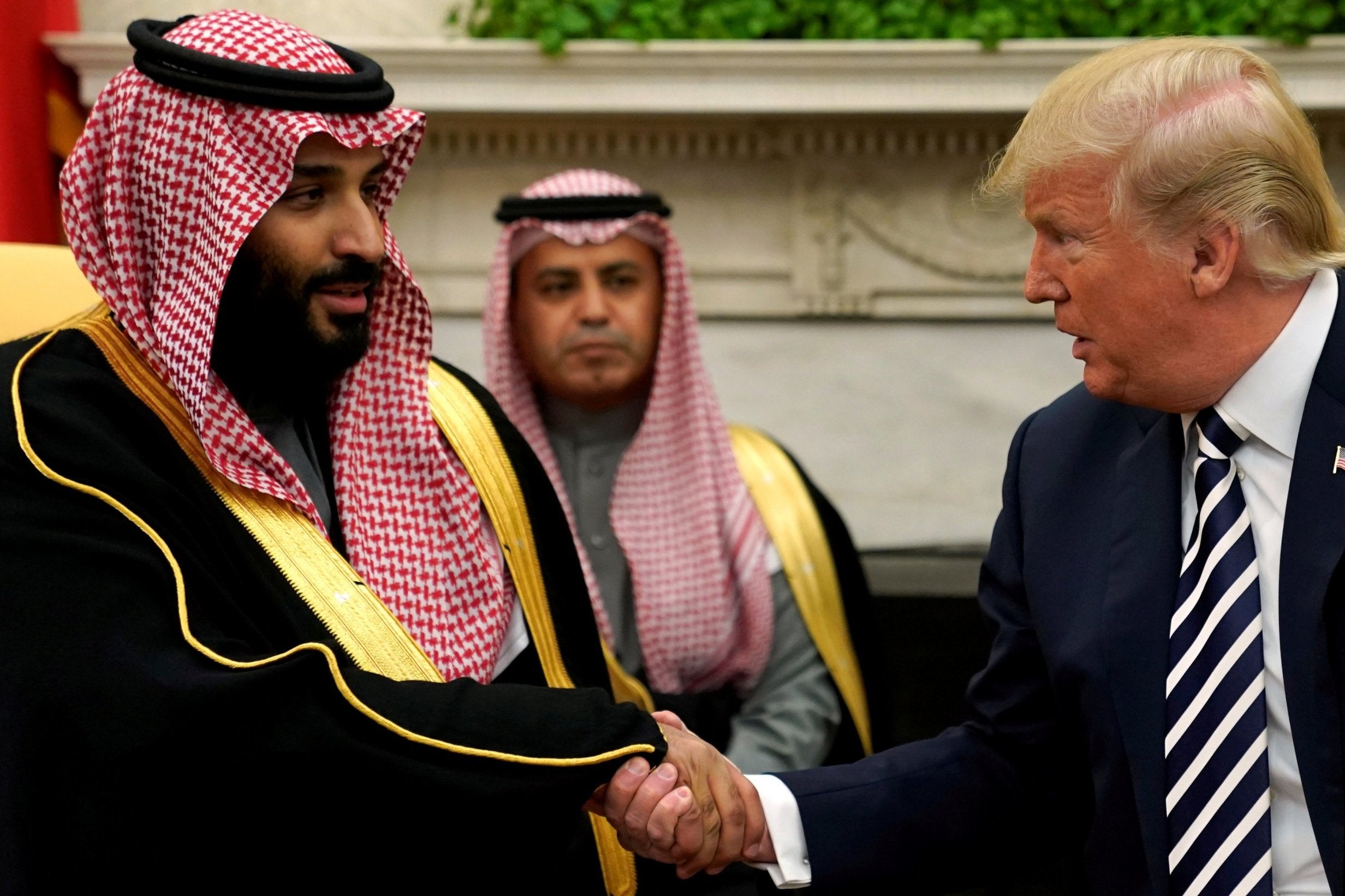Jamal Khashoggi's disappearance sends chills through dissidents across the Middle East
‘If this goes unpunished, it means that every tyrant in this bloody region has a licence to kill his opponents anywhere and everywhere. Anyone could do anything if this becomes the norm’
Your support helps us to tell the story
From reproductive rights to climate change to Big Tech, The Independent is on the ground when the story is developing. Whether it's investigating the financials of Elon Musk's pro-Trump PAC or producing our latest documentary, 'The A Word', which shines a light on the American women fighting for reproductive rights, we know how important it is to parse out the facts from the messaging.
At such a critical moment in US history, we need reporters on the ground. Your donation allows us to keep sending journalists to speak to both sides of the story.
The Independent is trusted by Americans across the entire political spectrum. And unlike many other quality news outlets, we choose not to lock Americans out of our reporting and analysis with paywalls. We believe quality journalism should be available to everyone, paid for by those who can afford it.
Your support makes all the difference.Abdul-Rahman Ayyash had gone abroad to help Syrians escaping that country’s war, planning to return home soon to Egypt and his family. But then Abdel-Fattah el-Sisi tightened his hold on the country, killing hundreds of anti-government protesters on the streets, and jailing many of Mr Ayyash’s friends.
A two-week trip turned into five often painful years of exile. The 28-year-old missed out on his sister’s marriage, his niece’s birth, his father’s long illness, and days spent with his childhood friends in his home town, the Nile Delta city of Mansoura. He eked out a living as a journalist and researcher in Istanbul, gaining a name for himself as a thoughtful critic of Mr Sisi’s human rights violations and corruption.
Now, following what is widely feared to be the brutal assassination in Istanbul of a leading Saudi exile journalist, Jamal Khashoggi, Mr Ayyash again fears for his safety.
“When I think about Jamal, he was doing exactly what I’m doing – travelling around to conferences, writing in Arabic and English,” said Mr Ayyash. He met repeatedly with Mr Khashoggi, who is missing and feared dead following a 2 October visit to the Saudi consulate in Istanbul.
“For everyone in my circle, Jamal’s case is the only thing we are talking about,” he said. “The worst thing we thought might happen is we would go into our embassy or consulate, and they would harass us somehow, maybe take our passports. Our imagination never reached the point that we could be abducted and killed in our own embassy.”

Mr Khashoggi’s disappearance – possibly at the hands of a 15-member team that arrived in Istanbul from Riyadh shortly before his disappearance and headed abroad quickly afterward – has terrified and traumatised many other Middle East activists, journalists, dissidents, and scholars who were forced to flee their countries.
“We’re all a target now,” said Joseph Bahout, a French-Lebanese scholar who is often critical of Syrian ruler Bashar al-Assad. He spoke from Beirut, where he frequently travels and which remains an area contested by allies of Saudi Arabia and its rival Iran. “If this goes unpunished, it means that every tyrant in this bloody region has a licence to kill his opponents anywhere and everywhere. Anyone could do anything if this becomes the norm.”
Unnamed Turkish and US officials have described Mr Khashoggi’s disappearance as a probable assassination. It wouldn’t be the first such incident in a region rife with armed conflict, bombings, and clandestine shadow wars. Libya’s Muammar Gaddafi and Iraq’s Saddam Hussein had few compunctions about gunning down outspoken critics abroad. Iran appears to have begun to ramp up a decades-old practice of assassinating dissidents in exile. An Iranian activist in the The Hague and an Iranian-British satellite television executive in Istanbul were among those shot dead under unexplained circumstances over the last couple of years.

But those countries all acquired pariah status, while oil-rich Saudi Arabia remains a member of the international community in good standing. Next week, US treasury secretary Steve Mnuchin and the CEOs of JPMorgan Chase and Uber are scheduled to attend a forum in Saudi Arabia hosted by Crown Prince Mohammed bin Salman, who has been accused by US intelligence officials of ordering Mr Khashoggi’s abduction. Saudi Arabia has also repeatedly snatched dissident members of the royal family abroad, dragging them back to the kingdom against their will.
Saudi officials insist Mr Khashoggi left the embassy shortly after he arrived, a narrative contradicted by reams of security camera footage leaked by Turkish officials to local and international media.
“Gaddafi used to do such things and paid a high price,” said Yahia Assiri, a Saudi dissident in London, and a good friend of Mr Khashoggi. “If this thing goes and Saudi doesn’t pay a price, so many countries around the world will copy this. It it will become a precedent.”
He added: “The very important thing is that those dictators are copying each other. They learn from each other.”
Mr Khashoggi, at one point a Saudi insider, fled his country for the US last year. He began to carve out a career for himself as a writer and commentator, critical of the rise of Crown Prince Mohammed. Since coming to power and serving as the de factor ruler of the country under his father, King Salman, the Saudi crown prince has launched a series of economic and social reforms lauded by the West. But he has also jailed dissidents of all stripes, and occasionally targeted outspoken critics abroad.
Mr Khashoggi went to the Saudi consulate in Istanbul to obtain paperwork to settle personal matters, a run-of-the-mill procedure for many people living abroad including expatriates, refugees and migrant labourers who must seek consular assistance for renewing passports, registering births, certifying marriages, and completing university applications.
Mr Ayyash said he had no fears when he last visited the Egyptian consulate in Istanbul four years ago, but will think twice if he must go again now. He noted that Mr Khashoggi maintained cordial ties with Prince Khalid bin Salman, the Saudi ambassador to Washington and brother of the Crown Prince, a relationship that apparently offered him no protection.
”It’s a very grave situation, if it could happen in a consulate,” said Yasin Aktay, an adviser to Turkey’s ruling Justice and Development Party and a friend of Mr Khashoggi. “There have to be consequences.”
Saudi activists say they have been transfixed by the news of what happened to Mr Khashoggi, frantically searching for updates and reactions from Saudi officials. ”It wasn’t even just any target; this was Jamal,” said one Saudi scholar based abroad. “He held up the ceiling for the rest of us, [so] to speak. He had years of connections and a reputation behind him. Half of us were still careful around him in case he was a spy for the government.”
The scholar, who asked for her name to be withheld, said Mr Khashoggi's disappearance had profoundly affected her and others’ feelings about their homeland. Every job offer from back home, every invitation to a conference, or outreach from a government official has become fraught. “We shift between feelings of never wanting to go back, to fearing we will never be able to go back,” she said. “There is a deep hurt or pain that occurs when your government rejects you, when all you wanted to do is make things better.”
The uproar over the incident, and the public relations damage it has inflicted on Saudi, could make leaders wary of any such violence in the future. The Saudi leadership is clearly rattled by the international reaction to the alleged abduction, which it strenuously denies. But as one of the world’s top oil exporters and arms importers, Saudi Arabia is also in a unique geopolitical position.
“It increases the incentives and desires for crazed, power-obsessed rules-free people like Sisi to think they can get away with it,” said Sarah Leah Whitson, Middle East director of Human Rights Watch. “But nobody but Saudi has the carte blanche.”

Join our commenting forum
Join thought-provoking conversations, follow other Independent readers and see their replies
Comments